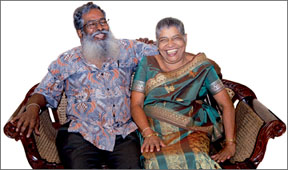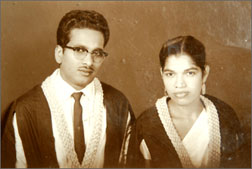|
Darling we aren't too old, though we pass the Jubilee
Gold
From a quiet love affair to wedding bells
by Lakmal Welabada
|

Pix: Chinthaka Kumarasinghe
|
"At the Peradeniya campus, the Colombo crowd who assumed them as an
elite group called themselves the 'Cultroos', shortening the 'cultured
people'... And us, those who came from Central Colleges were called 'Haramanis',
the uncultured lot. Fortunately both of us were in the same category,
the Central College products," says the couple Dr. and Prof. Endagama.
Prof. Malani Karunanayaka Endagama is today in-charge of the Ceylon
History project launched by the Ministry of Education in order to revive
'History' as a compulsory subject in the school syllabus from grade six
to 12. Dr. Pandula Endagama, a rebel who has raised his head and voice
in many circumstances during the crises of the nation works as a
Consultant for Environment and Culture at present.
"Ours was a love affair which grew quietly and flowed silently
through a stream that didn't have that much rocks and obstacles," grins
Pandula. It seems that his long grey beard was giving him an especial
identity. 'I'm a real Sinhalese,' is what he intends to denote.
 "I was a fresher when I first saw him," reminisces Malani. "I came to
meet her room mate who was from Seevali Central College, the same school
of mine. And since then on I was their guardian who would go alone with
them to the town , for shopping, to Dalada Temple etcetera," he laughs. "I was a fresher when I first saw him," reminisces Malani. "I came to
meet her room mate who was from Seevali Central College, the same school
of mine. And since then on I was their guardian who would go alone with
them to the town , for shopping, to Dalada Temple etcetera," he laughs.
"We didn't like to go alone to the town. So we, four - five girls
used to get together and go out. We always called him to accompany us as
we believed we should have a male guardian. That was something we
practised in our villages," she smiles.
So like a thorn amidst the flowers Pandula was used to proceed with
the bevy of girls. He didn't mind that as he knew the girls who had come
to the University from the village would not waste time and money
unnecessarily. So he was not bored even to shop along with them. Instead
he kept the girls alive with his rib tickling jokes.
All of them wore local handloom sarees. Some had a plait and others
were satisfied with a knot, and other than that they had not adopted any
especial styles for their hair.
Except for a few bangles, a chain and a wrist watch these Central
College girls were not interested in any other artificial things to hang
on them. Pandula compared the beauty between the heavy made-up faces of
the so called elite 'Cultroos' campus girls and these village damsels
who were without a dot of make up.
Cultoors
Pandula who was a rebel at campus while being a Student Council
activist of the Peradeniya University with his Leftist ideas and
principles, had got an ample choice for his selection. Everybody thought
the Romeo was behind his school mate. So did Malani.
But only Pandula knew that something different was happening within
him, especially when he saw Malani.
Malani took everything lightly, and was with a wide smile all the
time, but a bit strict and straight forward. And Pandula liked it.
Malani Karunanayaka was born on September 5 in 1940 to a family of
farmers. Kuruneris Karunanayaka and Waharaka Sumanawathie of
Galapitamada, off Warakapola were her parents. She was the one before
last of the 7 siblings in her family.
After studying at the village school she entered the Narangastenna
Mix School. "I got through the grade five scholarship and entered the
Ruwanwella Central College," she says.
"I was also a grade five Scholar, and that helped us to go right up
until we finished our university education," butts in Pandula. "All of
us must thank C.W.W.Kannangara, Education Minister of the State Council
in 1945. He fought to get the free education system to Sri Lanka.
It was he who started Central Colleges all over the island so that
the rural, clever, poor children could also come up in life. This really
helped the poor as unlike today the villagers didn't have easy access
including the exposure of knowledge and transportation to reach the
leading schools in the city.
So before this bill was passed the clever children born in the
villages withered like the flowers in the jungle without blooming up and
spreading the sweet smell to the world. Kannangara's path to pass the
bill was full of stones and thorns. His proposal was looked down up on
heavily by the Colonial Government, local capitalists and the local
media.
They strongly opposed the free education system saying that the
education must be restrained only to the deserving cases meaning who had
money.
Those who supported him were the State Councillors E.A.Nugawela and
A.Ratnayaka, leftists like Dr.N.M.Perera and S.A.Wickremasinghe,
Educationist E.W.Adikaram and P. De S. Kularatne and the Buddhist
priests. However that great man Kannangara lost his electorate at the
very next election. But what he sowed in the field of education in this
country has still been reaping its harvest," explains Pandula with deep
anguished enthusiasm.
"We lived in a village full of paddy fields," continues Malani.
"Living in a village was so simple and beautiful. I still feel the smell
of the pot of rice filled with 'Aluth Sahal' (new rice). It spread a
smell to make you hungry," reminisces Malani.
"There were 30-40 houses in the village. Every family (house) owned a
paddy field, chena, cows and buffaloes.
All what those old villagers grew were useful things. In the chenas
we grew yams like Kurakkan, Al Vee, Amu, vegetables and fruits. Jak,
Breadfruit, Sweet potatoes, Manioc, Kiri Ala and Kathurumurunga were
some of the trees we grew in our compounds.
We fulfilled our food needs from our own village. Villagers exchanged
the crops among themselves and there were no selling or buying
vegetables, rice, yams, grains and milk. It was a self sufficient
village," she explains.
"We, the children used to get up around 5 o'clock in the morning and
help the parents with the house hold chores. We might sweep the house
and garden, milk the cows, water the betel creepers and other plants and
fetch water from the wells for use in the day, before we went to school.
And when we came from school we had to do a series of jobs once again.
We did everything happily. Nobody grumbled over it," explains Malani.
"I too still remember how we sang 'Pal Kavi' at chenas in the night.
We really enjoyed all that. Actually it was a matter of teaching the
children about the different aspects of life. This training helped us to
become more versatile in life. Today it would have been interpreted as
child slavery imposed by the parents. But, also unlike today we never
saw a gap between the parents and children as we all were together all
the time," describes Pandula of the old day family unit and self
sufficient village life.
They zoom back to their hostel lives. "The scholars like us got
everything from the school hostel from the Rs,30 that the government
paid straight away to the hostel warden per month.
And when in the university we got about Rs,100 per month, out of
which we could even save a little for our pocket money as well. The
meals provided by the university hostel were better than that of today's
Five Star Hotel. So we didn't need to ask money from our parents as we
could manage everything along with the scholarship money," says Malani.
Endagamage Pandula Endagama was born on December 16 in 1938 to a
Endagamage Mohotti and Thippale Vidanalage Yasohamy at Thuththiripitiya
village at Niwithigala electorate, Ratnapura.
"Ours was also a family of farmers," he says. Pandula was the 10th of
the 12 children in the family. He lost his mother when he was 4 years
and it was his older sisters who looked after him. He learnt the
alphabet at the Watapotha Bilingual School and then entered Karawita
Central College in 1950.
"I studied up to Senior School Certificate exam (SSC) at Karawita
Central. I was the first to go up to the SSC level in my whole village.
So all my family members and relatives were thrilled over it. I
organised a tea party for the whole school which consisted of about
1000, by arranging sweet meats from my village before I left there.
I still remember how my village people came to Karawita Central in a
procession carrying 'Kuraniyas' of Kavum and other stuff. I entered
Seevali Central, Ratnapura to do Higher School Certificate (HSC) exam
and University Entrance (UE)," reminisces Pandula. Malani was in her
third year when Pandula's father died. Pandula had already passed out
from the university and was teaching at Siri Sumana Pirivena headed by
Henpitigedara Gnanasinghe Thero, one of the powerful guides of
Mrs.Sirimavo Bandaranaike's Government.
After seeing Malani at the funeral house, Pandula's family members
and relatives insisted that he settle down. So they tied the knot on
November 21 in 1963. "It was just a registration at the Kegalle
Registrar's Office. We ever didn't have a wedding photograph as I didn't
believe in them," says Malani who has adopted the leftist ideas and
principles of Dr.N.M.Perera like her husband. "I'm a very practical
person," she continues.
Malani became a lecturer in the History Department of the Peradeniya
University. She got her doctorate in 1973 and the full Professorship in
1997. She retired in 2005. Pandula, after being a teacher for a few
years became a Acting House Master at the Probation Department.
"It was an unhappy place as I didn't agree with the way the boys
brought for the rehabilitation were treated," he recalls. Then he
switched on to what he really liked - to form the Sinhala Encyclopedia.
He joined as the Editor of Sociology and ended as the Deputy Editor
of the whole thing. He became the Assistant Director of the Department
of Anthropology of the National Museum from 1972 to 1991. After retiring
at the age of 50 he was appointed as the Director of Central Environment
Authority in 1991.
At present Dr.Pandula Endagama serves as a freelance Consultant of
Culture and Environment dealing with national issues, basically Buddhist
and cultural matters in the country. "I'm very much involved in it," he
says with pride.
"We treated all our village relations well. We opened our doors at
home to all of them as we were the only known people of theirs in
Colombo. Even if they came dead at night, my wife used to cook for them.
She did all that on her own.
She looked after many of my sick relatives with out a grumble. We are
very happy when thinking about the service we did to others," says
Pandula. "Helping others has been the hobby of both of us," smiles
Malini. With her four daughters and six grand children the Endagama
couple live a quite peaceful yet busy life still serving the nation.
[email protected] |
